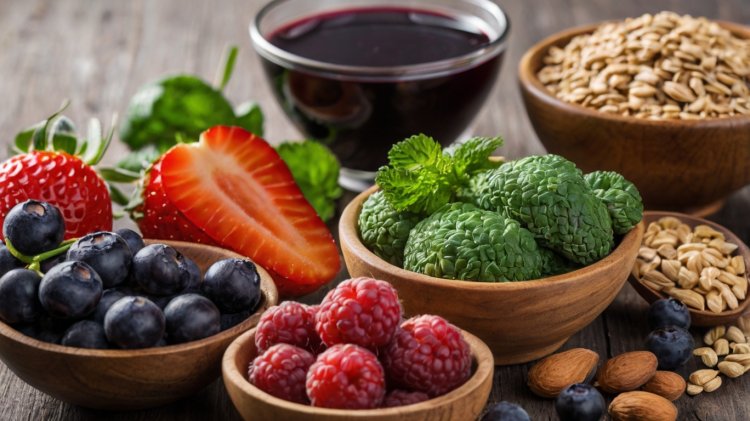5 Superfoods You Should Be Eating for a Healthier You
Transform your health with these 5 nutrient-packed superfoods! Discover their benefits, creative ways to enjoy them, and why they deserve a spot in your diet. Learn how kale, avocado, blueberries, quinoa, and salmon can supercharge your well-being.

5 Superfoods You Should Be Eating for a Healthier You
Incorporating nutrient-dense superfoods into your daily diet can significantly boost your overall health. These foods are loaded with vitamins, minerals, and antioxidants that your body craves. Here’s why kale, avocado, blueberries, quinoa, and salmon should be your go-to choices for a healthier lifestyle.
1. Kale: The Nutrient Powerhouse
Kale has earned its spot as a top superfood due to its impressive nutrient profile. Packed with vitamins A, C, E, and K, this leafy green offers antioxidants and carotenoids that help fight inflammation and protect against chronic diseases.
Health Benefits:
- Supports eye health with vitamin A.
- Boosts the immune system with vitamin C.
- Enhances blood clotting and bone health with vitamin K.
- Helps combat oxidative stress with powerful antioxidants.
How to Enjoy Kale:
- Smoothies: Blend it with fruits like bananas and berries for a nutrient-packed drink.
- Kale Chips: Bake with a sprinkle of olive oil and your favorite spices for a crispy snack.
- Soups and Salads: Toss chopped kale into soups or salads for added texture and nutrition.
2. Avocado: The Good Fat
Avocados are not just creamy and delicious—they’re also packed with healthy monounsaturated fats, fiber, and a range of vitamins like A, B6, C, E, and K. They’re versatile and complement almost any dish.
Health Benefits:
- Improves heart health with healthy fats.
- Provides essential vitamins for skin and hair health.
- Aids digestion with dietary fiber.
How to Enjoy Avocado:
- Toast: Spread mashed avocado on whole-grain bread with a sprinkle of chili flakes.
- Salads: Add slices for a creamy texture and flavor boost.
- Smoothies: Blend with bananas and almond milk for a nutrient-dense drink.
3. Blueberries: Antioxidant All-Stars
Blueberries are tiny but mighty, offering an impressive amount of antioxidants, vitamin C, and manganese in every serving. These berries can enhance brain health and reduce inflammation.
Health Benefits:
- Supports brain function and memory with antioxidants.
- Promotes healthy skin with vitamin C.
- Aids bone health with manganese.
How to Enjoy Blueberries:
- Snacks: Enjoy a handful as a quick, nutritious snack.
- Breakfast: Top your oatmeal, yogurt, or pancakes with fresh blueberries.
- Desserts: Blend into smoothies or bake into muffins.
4. Quinoa: The Protein Powerhouse
Pronounced “keen-wah,” quinoa is a gluten-free grain loaded with protein, fiber, and all nine essential amino acids. Its neutral flavor makes it easy to incorporate into any meal.
Health Benefits:
- Supports muscle repair and growth with high protein content.
- Promotes digestion and fullness with dietary fiber.
- Provides omega-3 fatty acids for heart health.
How to Enjoy Quinoa:
- Salads: Use quinoa as a base and add fresh veggies, nuts, and a zesty dressing.
- Soups: Stir into broths for extra texture and nutrition.
- Pasta Substitute: Use quinoa instead of rice or pasta for a healthy alternative.
5. Salmon: The Heart-Healthy Protein
Salmon is an excellent source of omega-3 fatty acids, B vitamins, and protein. It’s a fantastic choice for promoting heart health and reducing inflammation.
Health Benefits:
- Supports brain and heart health with omega-3 fatty acids.
- Provides energy and cellular support with B vitamins.
- Aids in maintaining lean muscle mass with high protein content.
How to Enjoy Salmon:
- Grilled or Baked: Season with olive oil, lemon juice, and fresh herbs like dill.
- Salads: Add flakes of cooked salmon for a nutritious topping.
- Bowls: Pair with quinoa or rice and steamed vegetables for a balanced meal.
FAQs About Superfoods
1. What are superfoods?
Superfoods are nutrient-rich foods considered to be especially beneficial for health and well-being. They’re packed with vitamins, minerals, and antioxidants.
2. Are superfoods a replacement for a balanced diet?
No, superfoods should complement a well-rounded diet. While they are highly nutritious, they work best as part of a variety of healthy foods.
3. Can I eat too many superfoods?
Yes, overconsumption of any food can lead to imbalances. For instance, eating too much avocado can lead to excessive calorie intake, while excessive kale consumption might interfere with thyroid function in some people.
4. Are frozen superfoods as nutritious as fresh ones?
Yes, frozen superfoods like blueberries retain most of their nutrients because they’re typically frozen at peak ripeness.
5. How can I incorporate superfoods into my daily meals?
Add them to smoothies, salads, and soups, or enjoy them as snacks. Experiment with recipes to find combinations you enjoy.
Conclusion
Incorporating kale, avocado, blueberries, quinoa, and salmon into your diet is a simple yet effective way to improve your overall health. These superfoods provide a wealth of essential nutrients and are versatile enough to fit into any meal plan. Start experimenting with these powerhouse ingredients today for a healthier tomorrow!









